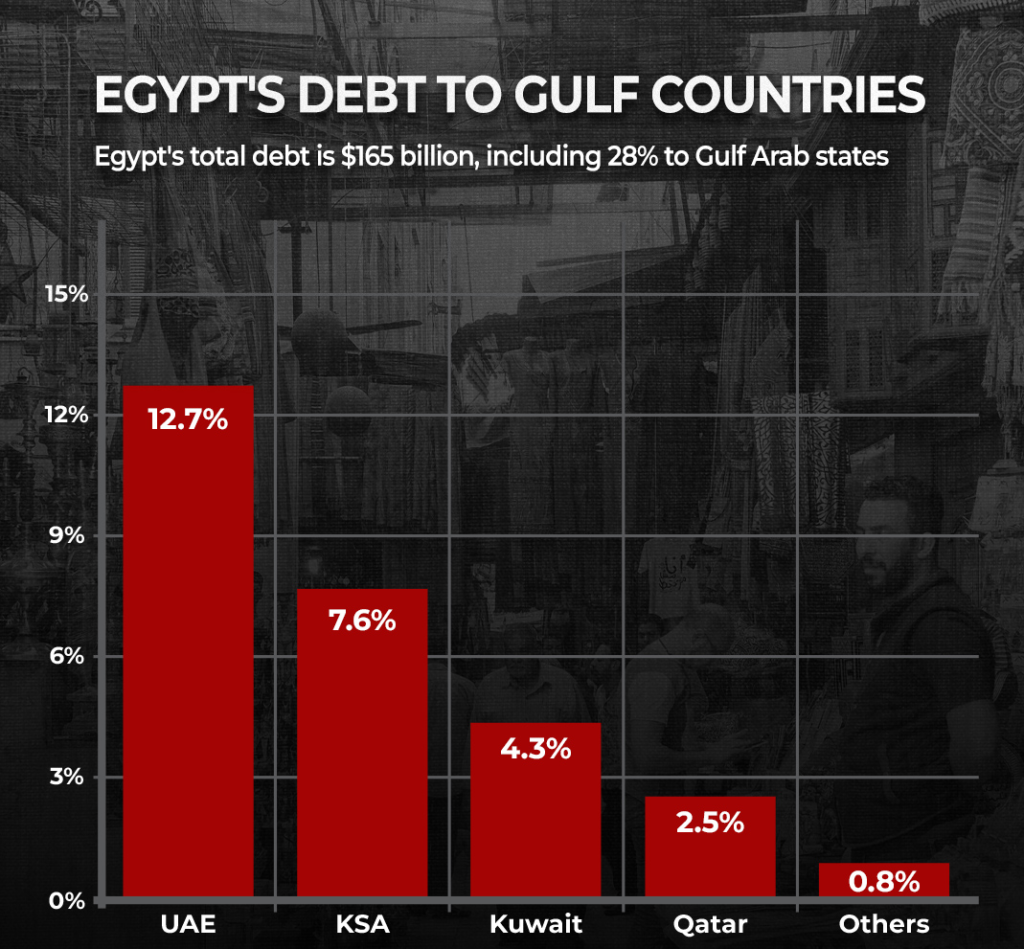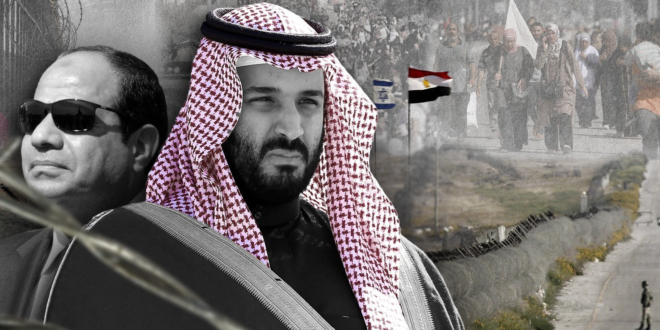Egypt’s stability is crucial for Saudi Arabia and the UAE, but now they’re linking financial aid to the mass displacement of Gazans to Sinai, which poses an even greater threat to Cairo’s national security.
As Israel’s brutal military assault on Gaza escalates, reports continue to swirl about a big Egyptian trade-off in the works: the absorption of large numbers of displaced Palestinians from the Strip in exchange for easing Cairo’s massive debt load – which surpasses $160 billion.
Yet more than four months after the war’s onset, Egyptian parliamentarian Mustafa Bakri says President Abdel Fattah al-Sisi has rejected $250 billion from foreign states as payment to allow Gazans to flood the Sinai.
Despite Cairo’s repeated rejection of forcibly transferring Palestinians into Egyptian territory, ongoing fears of a potential influx of Gazans fleeing Israeli atrocities, the viability of their return, and the destabilization of the Sinai border have continued to beset the Egyptian government. And important questions linger about who truly stands to gain from the displacement of Palestinians beyond Gaza’s confines.
As the conflict grows in both ferocity and breadth, it has become evident that for many Arab leaders, the Palestinian cause has become a secondary concern, if not a burdensome inconvenience. Arab states that normalized relations with Israel in 2020 – such as the UAE, Bahrain, Morocco, and Sudan – currently view Palestine as an obstacle to their diplomatic flexibility.
The plan: cash for displacement
As Israel advances militarily into Gaza’s southernmost territory, Rafah, photos and videos published by the Sinai Foundation for Human Rights reveal that Egypt has begun constructing a closed zone on its border with Gaza – ostensibly aimed at sheltering Palestinians fleeing the anticipated Israeli attack on Rafah.
The images show workers using heavy machinery to install concrete barriers and security towers around a strip of land on the Egyptian side of the Rafah crossing.
There is little doubt that the mass displacement of Palestinians poses a threat to Egypt’s national security in the long term. Still, the Saudis and Emiratis appear to be prioritizing this Israeli objective, and so Egypt faces a dilemma:
Either continue to reject displacement or accept a mass exodus to Sinai – even temporarily – in exchange for economic incentives that include offsetting a major part of its accumulated debt, which also threatens the Egyptian economy significantly and, by extension, its social cohesion.
Cairo has been complicit in Israel’s blockade of Gaza since 2007 and has played an active role in countering Palestinian resistance by flooding tunnels connecting the Strip to Sinai.
The critical role played by Saudi Arabia and Egypt in shaping post-war Gaza cannot be overstated. Riyadh’s embrace of normalization sets a dangerous precedent, fulfilling a long-held US–Israeli desire to integrate the occupation state into West Asia – to the detriment of Palestine.
This shift in dynamics represents a concerted effort to sideline the Palestinian cause in favor of broader regional political and economic guarantees from Washington. Speaking at this year’s Munich Security Conference, US Secretary of State Antony Blinken said there is an “extraordinary opportunity” in the coming months for the recognition of Israel among Arab states:
Virtually every Arab country now genuinely wants to integrate Israel into the region to normalize relations … to provide security commitments and assurances so that Israel can feel more safe.
It seems clear that Riyadh decided, from the beginning of the Gaza war, to prepare the internal environment for the post-Gaza phase, that is, the phase of normalization and settlement. Saudi Arabia insisted on not postponing any festival or celebration, prevented participating artists from showing sympathy for the Palestinians, punished those who sympathized with the martyrs of Gaza from a Saudi platform, and even banned the wearing of the Palestinian Kufiyyeh at Mawsim al-Riyadh, a state-funded annual festival.
Saudi Arabia’s meticulous plan to relegate the Palestinian issue to the annals of history comprises five strategic steps:
First, insulate domestic affairs from Gaza’s turmoil. Second, promote the two-state solution as a precursor to normalization with Israel. Third, coerce other Arab countries into following suit while isolating dissenting voices. Fourth, facilitate the displacement of Palestinians, both in the short and long term, by leveraging soft power incentives and economic inducements. In December, the French newspaper Le Monde leaked a controversial Saudi–French proposal to end the Gaza war by displacing Hamas leaders and members to Algeria.
Fifth, the kingdom seeks to foster economic ties with Israel to integrate it as a normal part of West Asia.
The success of Riyadh’s plan hinges on the compliance of key stakeholders Israel and Egypt, whose approval is paramount for normalization and the execution of Palestinian displacement.
Closing the file on the Palestinian cause and forging ties with Tel Aviv is an ambition the Saudis share with the UAE in pursuit of economic and political gains. Despite official Arab declarations rebuffing displacement plans, behind-the-scenes maneuvers suggest a different reality, one that veers towards the gradual dissolution of the Palestinian cause.
Saudis and Emiratis buy Egypt’s sovereignty
Riyadh’s sudden eagerness to bolster economic ties with Cairo is palpable. With unprecedented directives from both governments, mutual investments are set to soar, with Saudi Arabia aiming to ramp up trade to $100 billion.
Recent collaborations include a $4 billion deal with Saudi-listed ACWA Power for the Green Hydrogen project. Moreover, strategic initiatives like the memorandum of understanding between the Egyptian Ministry of Military Production and the Saudi General Authority for Military Industries and agreements in petroleum and mineral resources signal deepening economic integration.
Ongoing negotiations between Cairo and Abu Dhabi to develop a substantial tract of land along Egypt’s Mediterranean coast, potentially valued at $22 billion, could be a game-changer for Egypt’s beleaguered economy.
According to the CBE report, the proposed contract’s value encompasses a significant portion of the Egyptian government’s external debt due in 2024, totaling $29.229 billion. This includes interest payments totaling $6.312 billion and debt installments amounting to $22.917 billion.
Economic lifeline or political liability?
There is no doubt that the Saudi–Emirati interest in investing in Egypt is mainly driven by these two countries’ fears of Egypt’s economic collapse, which could destabilize a key, friendly Arab state in the region.
But information has surfaced that the two Gulf states’ offers to Egypt now tie the displacement of Gazans to a proposal to alleviate Cairo’s staggering debt burden. The reported US offer to wipe out $160 billion of Egyptian debt in exchange for hosting 100,000 Gazan refugees has a dangerous historical precedent. In 1991, Washington forgave Egypt’s debt in return for its support of the US-led coalition against Iraq.

Egypt’s monumental national debt ranks second globally in risk of default after Ukraine. Notably, Arab countries hold a significant portion of Egypt’s debt, with Saudi Arabia and the UAE alone accounting for approximately 20.3 percent.
Egypt’s looming economic collapse is not in the interest of either the Persian Gulf’s Arab states or their US ally due to the country’s strategic significance in the Arab world and North Africa – hence, the resolution of the Palestinian issue emerges as a shared priority among Saudi Arabia, the UAE, and the US.
The latter states’ normalization efforts align with their broader geopolitical strategies aimed at containing Iran and neutralizing the Axis of Resistance. Despite Saudi Arabia’s rhetoric endorsing normalization in exchange for Palestinian rights, its actions during the Gaza war confirm that Riyadh has, since day one, been working to sideline the Palestinian cause and inhibit any positive engagement with it.
In the long term, the establishment of a Palestinian state poses a threat to efforts aimed at permanently extinguishing the Palestinian issue. Thus, the prospect of displacing Palestinians to Egypt, despite the formidable obstacles, remains a viable strategy for Saudi Arabia and the UAE.
As geopolitical interests intertwine with economic imperatives, the fate of millions of Palestinians hangs in the balance, subject to the whims of power politics and strategic calculus.
 Eurasia Press & News
Eurasia Press & News


